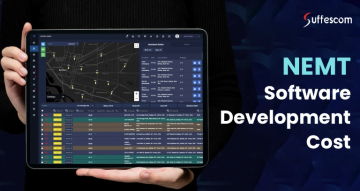How To Deploy a Smart Contract on Polygon (MATIC) – Step-by-Step Guide for Ethereum Scaling

Are you a business owner or developer looking to deploy your smart contracts on Polygon? You’re in the right place.
Deploying a smart contract to the blockchain can feel intimidating—especially when small mistakes can lead to real losses. That’s where we come in. At Suffescom Solutions, we specialize in Polygon development and Ethereum scaling solutions, making the process simple, secure, and efficient.
In this guide, you’ll learn what Polygon is, why it’s the go-to Ethereum Layer 2 solution, and exactly how to deploy your smart contracts using tools like Hardhat and MetaMask.
Hire Affordable Ethereum Scaling Solution Experts
Looking to hire affordable ethereum scaling solution experts? Look no further! Our team can help you deploy smart contracts on polygon and provide comprehensive service from start to finish.
What is Polygon (MATIC) and Why It Matters in Ethereum Scaling
Polygon is a Layer 2 blockchain network that improves Ethereum’s scalability by reducing gas fees and increasing transaction speed. As Ethereum adoption grows, the need for high-performance, cost-effective solutions like Polygon becomes critical.
The Problem With Ethereum Gas Fees
Ethereum's congestion and high transaction (gas) fees have become major roadblocks, especially for NFT projects, DeFi apps, and dApps.
How Polygon Solves It as a Layer 2
Polygon solves Ethereum's limitations by:
- Acting as a sidechain that supports Ethereum-compatible networks.
- Offering cheaper and faster transactions.
- Maintaining security through its own consensus mechanisms.
Polygon's Framework
Polygon's architecture or framework further classifies four layers; every layer is responsible for its services and functionality.
- Network Layer
- Ethereum Layer
- Execution Layer
- Security Layer
The Polygon Networks layer is in charge of local consensus and block production, whereas the Execution layer is in charge of the Ethereum Virtual Machine's smart contract execution.
The Ethereum layer and the Security layer are included in the optional layer; the first is a collection of smart contracts that provides services for transaction finality, staking, and communication between the Ethereum main chain and side chains, while the second provides security and validation across the Polygon network.
Can We Invest In Polygon Crypto?
Polygon is a very good investment option for many people. Polygon creates the possibility of a world without digital borders, where people may freely exchange value globally without the need for third-party mediators or gatekeepers.
This means that all blockchain networks will be able to share information without friction in the future. Polygon has already improved industry interoperability and taken significant strides toward a borderless digital world, making it an attractive investment for many.
Investment decisions depend on one's risk tolerance, but Polygon is usually regarded as a good investment, particularly because it addresses an industrial issue inside Ethereum and has far-reaching implications.
Purchasing Polygon is very uncomplicated. You need to visit the crypto exchange sites accessible, such as Coinbase or Binance. You can also get it from decentralized exchanges like Wrapped Ethereum or Uniswap if you're more experienced with cryptocurrency.
Why Use Polygon for Smart Contract Deployment?
Developers use the Polygon to generate post-blockchain networks with attributes relevant to the specific objectives. These may be modified further with a developing number of nodes, permitting programmers to develop sovereign blockchains with more range of power.
Polygon delivers this broader vision through a variety of technologies, such as:
Proof-Of-Stake (POS) Chain:
Ethereum sidechain Matic POS Chain, Polygon's main chain, offers a proof-of-stake (POS) security layer to blockchains developed on the network.
Plasma Chains:
Polygon leverages Plasma, a scaling interface that uses assets to relocate between the root and child chains via Plasma bridges.
Zero-Knowledge (ZK) Rollups:
An alternative scaling technique that combines zero-knowledge proofs for the final public information on the Ethereum main chain to compress many off-chain transfers into a single transaction.
Benefits Of Choosing Polygon Over Other Cryptos
Polygon is an intriguing blockchain project that focuses on interoperability and scale, two of the technology's most commonly stated issues. The network has already surpassed its initial goal for Matic by delivering a broad collection of tools for developers to construct high-performance, high-scaling blockchain protocols, and dApps.
It is the first scaling solution to fully support the Ethereum Virtual Machine (EVM), Ethereum's blockchain-based infrastructure for building decentralized apps (dApps).
Ethereum scaling solution is also unique in that its security technique is optional, allowing blockchains to preserve their independence. As a result, linked blockchains can have perfect interoperability with the Ethereum mainchain without employing Polygon's security-as-a-service method.
Polygon's flexibility is essential for developers to design completely interoperable dApps that take advantage of several linked blockchains.
A well-rounded approach to scaling solutions can future-proof the network in these times of rapid technological innovation. This ensures that if one solution becomes the industry standard, it will not become obsolete.
How To Create & Deploy Smart Contract On Polygon
The Polygon Network is a two-layer solution that is Ethereum Virtual Machine compatible. This implies using the Polygon Network to implement an Ethereum smart contract.
Tools or Platforms For Creating Polygons
You may use the same programming tools utilized for Ethereum development as a Polygon developer. You can develop and interact on the Polygon layer 2 blockchains using these platforms:
- Alchemy
- Chainstack
- QuickNode
- Remix
- Truffle
- Hardhat
Choose Best Ethereum Scaling Solution Development Experts
Are you struggling to choose the best ethereum scaling solution development experts? Our team offers a wealth of experience and expertise in this area, and can help you make the right choice for your project.
The Steps For Deploying a Solidity Smart Contract To The Polygon/Matic Network Are Below.
Connect Polygon to MetaMask Wallet
Firstly, we need to connect our MetaMask wallet to the Polygon network. You need to:
- Open MetaMask in your first step
- Then, click on "Add Network."
- After that, add some values asked
Include Polygon tokens in the wallet
We need MATIC tokens for the polygon network. There are two ways to add polygon tokens to the wallet.
- Exchange $MATIC and transfer it to your MetaMask wallet.
- Use crypto faucet: https://matic.supply.
Create Polygon app
Follow the steps to create your polygon app/node:
- Go to your platform dashboard and click "Create App. "
- Enter your name and full description asked.
- Now click "Create App" and finish creating your polygon node.
- Now create a new project in your dashboard with any name.
Download Hardhat & Create Hardhat Project
Hardhat is an Ethereum development environment that allows you to compile, deploy, test, and debug your code. It aids developers in developing smart contracts and decentralized applications (dApps) locally before deploying to the live blockchain.
Add Project Folders
Next step is to create two new folders in your project under the dashboard area. The first folder is where you'll add your project contract code file. And in the second folder, you'll keep the scripts to deploy and interact with the contract.
Write The Contract
Now, open the project in your editor. Solidity, the polygon language, is used to write smart contracts. Open the "Contracts " folder and create a new file. Copy & paste the content into the file and read the comments to understand the contract.
Connect MetaMask & The Platform To Your Project
We need to connect the MetaMask clone wallet, your platform, and our written smart contract.
Install Ethers.js Library
Ethers.js is a package that wraps normal JSON-RPC methods in more user-friendly methods, making it easier to communicate with and make requests to Ethereum.
Compile The Contract
We need to compile the contract to ensure everything is working so far. You might get some warning, but there's no need to worry about it.
Write Deploy Script
It's time to write our contract deploy script now that our contract has been written and our configuration file has been approved. Further, create a file with "deploy.js" in the scripts/ subdirectory and fill it with the content.
Deploy Contract On Polygon
Now, we're finally ready to deploy our contract. Open the command line and run:
npx hardhat run scripts/deploy.js --network polygon_mumbai
Now you will see:
Congrats! You've just launched a smart contract on the Polygon network.
Launch Your Own Ethereum Scaling Solution With Us
Ready to launch your own ethereum scaling solution? Our team can help make it happen! With our expertise, you can be confident in the success of your project and achieve your goals.
Hire Best Polygon Blockchain Developers: Suffescom Solutions
We believe in giving our clients web3 Polygon solutions that are economical and scalable. On the Polygon/Matic blockchain network, hire our dedicated certified polygon developers for blockchain networks, dApps, smart contracts, cryptocurrency exchange, and the NFT marketplace.
We assist companies worldwide in realizing the full potential of custom blockchain solutions by launching next-generation polygon L2 scaling solutions in the polygon ecosystem. Employ our multi-chain blockchain ecosystem professionals to help your company succeed. Polygon L2 Scaling Solutions is looking for a developer.
The polygon blockchain services we provide are:
- Chain Development
- dApps Development
- Wallet Development
- DeFi Smart Contract Development
- NFT Marketplace Development
- Integration Services
Our Polygon Development Process Includes:
Project Discussion
In this development phase, our polygon blockchain professionals discuss and grasp the client's vision and goal for the project.
Wireframe Development
In this development phase, our polygon blockchain professionals discuss and grasp the client's vision and goal for the project.
Application Development
Our staff continues to work on your decentralized App during this period of polygon application development.
Application Maintenance
During this phase, the team resolves any issues following the App's launch and provides ongoing support to ensure consistent performance.
Deployment Phase
We proceed to deploy the final product into the market when the application testing step is completed.
App Testing
The team continues to test quality checks after completing the polygon app-building phase.
Final Words
Polygon MATIC is the best choice when you want to get rid of Ethereum's hefty fees and slow-speed performance. Polygon has shown everyone that it can cover every issue of Ethereum, and that is why it is getting the best response every day.
Suffescom Solutions creates token standards based on blockchain networking so that new technology users can begin making money and fully realize the Polygon NFT marketplace potential.
We are the best polygon NFT marketplace development company in the USA, combining the best of Ethereum and other blockchain networks.
FAQs
1. What is Polygon used for in smart contracts?
Polygon is a Layer 2 scaling solution that reduces gas fees and increases transaction speed for Ethereum-compatible smart contracts.
2. Is Polygon cheaper than Ethereum for deploying smart contracts?
Yes, Polygon offers significantly lower gas fees compared to Ethereum, making it a preferred choice for developers.
3. How do I deploy a contract on Polygon testnet?
You can use MetaMask, Hardhat, and connect to the Mumbai testnet. A faucet like matic.supply can help you get test MATIC.
4. Which tools are best for deploying contracts on Polygon?
Hardhat, Remix, Truffle, and Alchemy are popular tools for deploying smart contracts on Polygon.
5. Is MATIC the same as Polygon?
Yes. MATIC is the native token of the Polygon network, which was formerly called the Matic Network.







